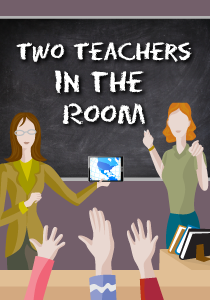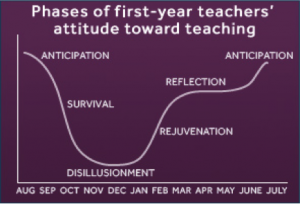End of Year: Reflecting on Reflection
A MiddleWeb Blog
 So here we are…at that summative time in our annual teaching cycle when we take a deep breath and reflect.
So here we are…at that summative time in our annual teaching cycle when we take a deep breath and reflect.
Even though the school year ends at different times for all of us, we are connected through the art of reflection.
I still have two more weeks to go, and I am making the most of it. Mixed emotions fill my mind:
- I wish I had more time to enjoy the learning process with the students.
- I feel a sense of pride as I see students’ progress this year.
- I feel a sense of urgency to continue guiding students who have begun to lose their grip on the school year in anticipation of summer.
- I’m eager to reflect deeply on the teaching practices that worked and didn’t work, as well as the ones that can work with a little tweaking for next time.
- I feel frustrated for all of the co-teaching lessons that flopped and invigorated about the lessons that went well. I realize both experiences have strengthened me.
- I am filled with excitement and anticipation as I think about the opportunity to establish positive co-teaching experiences for the upcoming school year.
- And finally, I’m looking forward to summer and the time to pursue my own learning and professional growth. It is a never-ending process.
And there you have it. Familiar feelings and reflections. This is a time when we think about the highlights of the past year. We think about summer plans. And we hopefully and eagerly anticipate the next school year to come.
I often hear my colleagues (myself included) commenting on certain lessons or unit plans: “Well, next year it will be better because…” We are excited to build upon our accomplishments and begin again in September with a clean slate–ready to improve upon our practice and guide students to achieve.
Many hats – many reflections
I have the privilege of wearing many hats throughout the school year. As a special educator, I experience the deep reflective teacher’s life first-hand. As a co-teacher, I collaborate with my colleagues and observe and share in their reflections. As my district’s Mentor Teacher Program Coordinator, I get to see the world of teaching through the perspective of new teachers. And as a college adjunct instructor, I have the pleasure of working with preservice teachers to help them acknowledge their personal beliefs, formulate their educational philosophies, and most importantly, begin to realize that they have an emerging teacher’s voice with much to say.
And so, I dedicate this post to all reflective teachers. Teachers who know that their work throughout the year results in a ripple effect that has the potential of spreading far beyond the time measured by just one school year. It’s quite humbling, really.
We know what it takes
Reflective teachers know what it takes to buckle up and get through the roller coaster ride of teaching. We know we must adjust our strategies and attitudes throughout the year in order to stay focused on our goals.

Through their experience and research, the New Teacher Center has identified some developmental phases that new teachers experience. I find this chart can also relate to veteran teachers (myself included). I think it serves as a great reflective tool. The mentors in my group share their insights into these phases of the teaching life as mentees relax and feel a sense of community.
At the end of the year, this chart helps me as I encourage this same group of teachers to reflect on the strategies that they used to get them through the various stages of the school year. It is such a powerful tool to get some deeper reflection to the surface. And then, equally as important, it guides my focus as we help empower our novice teachers with proactive tools for the upcoming school year — when the roller coaster ride of phases will begin again.
Check out a full description of the Phases of First-Year Teaching by NTC founder Ellen Moir. I think the phases she describes can remind all teachers to stay focused on what’s most important. At each phase we can power ahead by remembering that what we do, we do for students. The ultimate goal is to guide students to achieve at their personal best. Now isn’t that an empowering thought to remember to help us rise above the disillusionment?
Reflections on co-teaching

To get the conversation going, and in the spirit of reflecting, I asked a colleague who is getting ready to retire this year to reflect on her view of inclusion and co-teaching after a long career. Kim Gilbert is a special education teacher at Smithtown Central School District who is retiring at the closing of this school year.
Q: What is your secret for successful co-teaching experiences?
Kim: One of the things that has made the co-teaching experience successful for me is the fact that I have had the privilege to be with the same team for so long. It allows us to build relationships and become comfortable with each other’s style and build on that each year. It allows me to be really comfortable with the curriculum so I can concentrate on strategies for differentiating instruction and make the teaching more fluid.
In addition I have had time to reflect each summer and think about how to improve instruction since I am able to anticipate what will be expected of my students. It takes time to really function as a team and I am fortunate that we have had the opportunity to work so closely together for so long.
Q: What advice would you give to teachers who are anticipating their first co-teaching experience?
Kim: Put yourself in there and communicate what you need as well as what you are able to do. Planning time is important, but communication even more so. Find a way to really talk with your co-teacher about the students and be clear about offering to share grading or preparation responsibilities. Not always easy, I know.
Thanks, Kim. We wish you all the best as you combine rejuvenation and reflection in anticipation of your next adventures.
So, what are your reflections? What strategies do you use to help you to rejuvenate? How do you rise above any disillusionment? Come share and celebrate by keeping this conversation going…
We have so much to learn from one another!




































